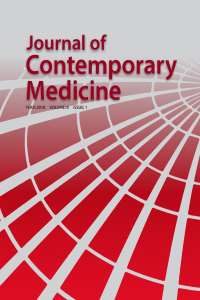Early Against Classic Extubation Outcomes Following Cardiac Surgery and Correlation With Rapid Shallow Breath Index
Early Against Classic Extubation Outcomes Following Cardiac Surgery and Correlation With Rapid Shallow Breath Index
cardiac surgery, early extubation,
___
- Referans 1) Rashid A, Sattar KA, Dar MI, Khan AB. Analyzing the outcome of early versus prolonged extubation following cardiac surgery. Ann Thorac Cardiovasc Surg. 2008;14(4):218–23
- Referans 2) Zayat R, Menon AK, Goetzenich A, et al. Benefits of ultra-fast-track anesthesia in left ventricular assist device implantation: a retrospective, propensity score matched cohort study of a four-year single center experience. Journal of Cardiothoracic Surgery. 2017;12:10. doi:10.1186/s13019-017-0573-9
- Referans 3) Camp SL, Stamou SC, Stiegel RM, et al. Can timing of tracheal extubation predict improved outcomes after cardiac surgery? HSR Proceedings in Intensive Care & Cardiovascular Anesthesia. 2009;1(2):39-47.
- Referans 4) Huaringa AJ, Wang A, Haro MH, Leyva FJ. The weaning index as predictor of weaning success. J Intensive Care Med. 2013 Nov-Dec;28(6):369-74. doi: 10.1177/0885066612463681.
- Referans 5) Jeganathan N, Kaplan CA, Balk RA. Ventilator Liberation for High-Risk-for-Failure Patients: Improving Value of the Spontaneous Breathing Trial.Respir Care. 2015 Feb;60(2):290-6. doi: 10.4187/respcare.03111.
- Referans 6) Siner JM, Connors GR. Protocol-based care versus individualized management of patients in the intensive care unit. Semin Respir Crit Care Med 2015;36(6):870.877.
- Referans 7) Chan JL, Miller JG, Murphy M,et al. A Multidisciplinary Protocol-Driven Approach to Improve Extubation Times Following Cardiac Surgery. Ann Thorac Surg. 2018 Mar 9. pii: S0003-4975(18)30319-9. doi: 10.1016/j.athoracsur.2018.02.008. [Epub ahead of print]
- Referans 8) Wong WT, Lai VK, Chee YE, Lee A. Fast-track cardiac care for adult cardiac surgical patients. Cochrane Database Syst Rev 2016;9:CD003587.
- Referans 9) Cove ME, Ying C, Taculod JM et al. Multidisciplinary extubation protocol in cardiac surgical patients reduces ventilation time and length of stay in the intensive care unit. Ann Thorac Surg 2016;102(1):28.34.
- Referans 10) Karthika M, Al Enezi FA, Pillai LV, Arabi YM. Rapid shallow breathing index. Annals of Thoracic Medicine. 2016;11(3):167-176. doi:10.4103/1817-1737.176876.
- Referans 11) Cheikhrouhou H, Kharrat A, Derbel R, et al. L’effet de l’extubation precoce apres chirurgie cardiaque pour la rehabilitation post opératoire. The Pan African Medical Journal. 2017;28:81. doi:10.11604/pamj.2017.28.81.11432.
- Referans 12) Yang KL, Tobin MJ. A prospective study of indexes predicting the outcome of trials of weaning from mechanical ventilation. N Engl J Med 1991;324:1445–50.
- Referans 13) Juern JS. Removing the critically ill patient from mechanical ventilation. Surg Clin North Am. 2012;92(6):1475-83.
- Referans 14) Engoren M, Buderer NF, Zacharias A, et al. Variables predicting reintubation after cardiac surgical procedures. Ann Thorac Surg 1999;67(3):661–5.
- Referans 15) Akhtar MI, Sharif H, Hamid M, et al. Fast Track Extubation In Adult Patients On Pump Open Heart Surgery At A Tertiary Care Hospital. J Ayub Med Coll Abbottabad. 2016 Oct-Dec;28(4):639-643.
- Referans 16) David RA, Brooke BS, Hanson KT, et al. Early extubation is associated with reduced length of stay and improved outcomes after elective aortic surgery in the Vascular Quality Initiative. J Vasc Surg. 2017 Jul;66(1):79-94.e14. doi: 10.1016/j.jvs.2016.12.122. Epub 2017 Mar 31.
- Referans 17) Meade MO, Guyatt G, Butler R, et al. Trials comparing early vs. late extubation following cardiovascular surgery. Chest 2001;120:445S–53S.
- Yayın Aralığı: Yılda 6 Sayı
- Başlangıç: 2011
- Yayıncı: Rabia YILMAZ
Analysis of Bed Use Performance of Pediatrics Clinics in Turkey
Ayşe TALİ, Elif KARAHAN, Füsun CÖMERT
Unal BICAKCI, Yaşar ISSI, Beytullah YAĞIZ, Berat Dilek DEMİREL
KNOWLEDGE LEVEL OF SENIOR NURSING STUDENTS ABOUT KANGAROO CARE: A MULTI-CENTERED RESEARCH
Filiz ÜNAL TOPRAK, Zekiye TURAN, Ayten ŞENTÜRK ERENEL
Muhammet LİMON, Dilek TEZCAN, Semral GÜLCEMAL, Sema YILMAZ, Neriman AKDAM
Melih YÜKSEL, Halil KAYA, Faruk ÇAVDAR, Suna ERAYBAR ATMACA, Yeşim İŞLER
Dilek TEZCAN, Muhammet LİMON, Semral GÜLCEMAL, Sema YILMAZ
Yılda Arzu ABA, Deniz SARICI, Ramazan ÖZYURT, Bulat Aytek ŞIK
